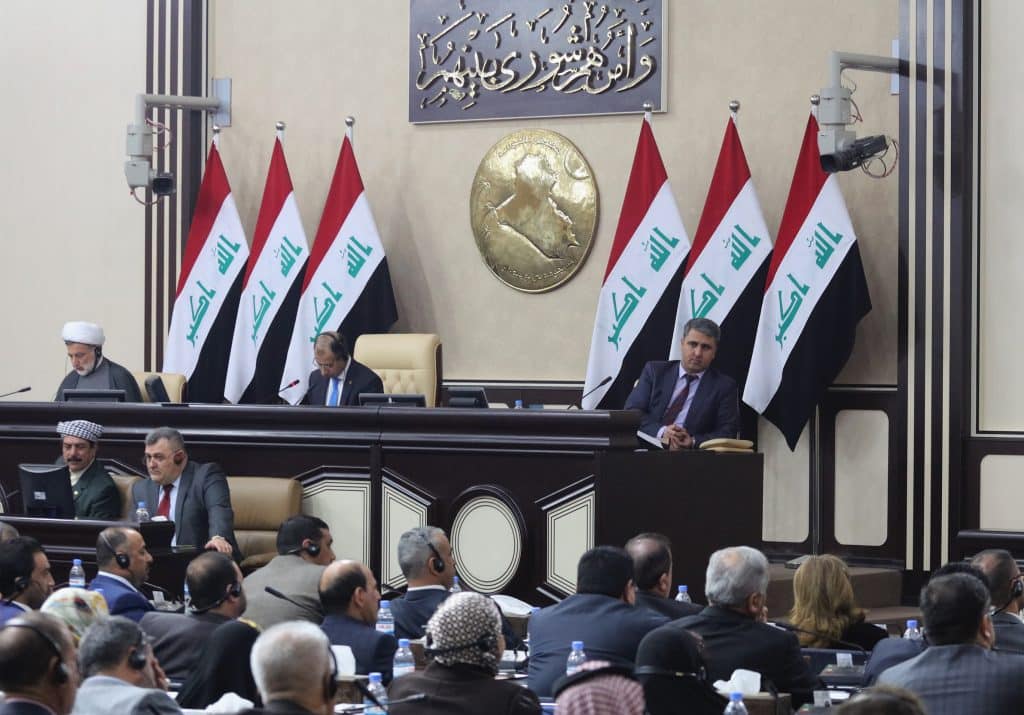Photo: the Iraqi parliament in Baghdad - Flickr
In a new legislative amendment proposal in Iraq lies the chance of legalising child marriages. At issue is the ''Personal Status Law'' No 188 from 1959 that regulates matters surrounding marriage, custody and general family law in Iraq. The proposed change in the law will require married couples to make an official choice between Shia or Sunni representation, whose religious laws will then officially administer their personal status, such as marriages. Under certain Shia jurisprudence, the marriage of 9-year-old girls and 15-year-old boys would be allowed.
Although the country has a general upward increase has made towards a more full democracy and gender equality, recent proposals from the SCF (Shiite Coordination Framework), who form the largest bloc in the Iraqi parliament, to put a stick to this. The amendment would give local religious leaders the power to recognise official marriage contracts based on their jurisprudence, which would legalise child marriages and thus undermine women's rights, and thus basic human rights.
Religious leaders on the threshold of more legal power
Recent outcry from the UN, human rights organisations and women's and children's rights activists have turned a spotlight on the ''Personal Status Law'' bill. ''Law No 188'', as the law is also called, was instituted in 1959 by Abdul-Karim Qasim, who led a progressive and nationalist government and sought, among other things, the improvement of women's rights in Iraq. The law is believed to be one of the most liberal in the Middle East and has for a long time protected the basic human rights of the Iraqi people and a neutral rule of law in Iraq as well as implemented a more democratic approach. This is mainly brought about by the secular nature of the law that keeps rule of law and religion separate. The ''Personal Status Law'' ensures that family law cases are determined according to a civilian, independent jurisprudence, unlike religious jurisprudence that is still used officially in many surrounding countries and unofficially in Iraqi rural areas, even now. The change proposed by the 'Shiite Coordination Framework' to give religious leaders official jurisdiction over family matters could reverse all this.
Trend of problematic law changes?
Although there are still parts of the Iraqi population that still have conservative views on issues such as homosexuality and women's rights, this was not yet visible in the laws. Unfortunately, this has changed for the former group. Earlier this year, a bill accepted which imposes prison sentences of 10 to 15 years for people having LGBT+ relationships. In addition to this, there were also prior amendments to the ''Personal Status Law'' No. 188 proposed regarding women's rights and gender equality that also included a worrying development forms, with banning Muslim men from marrying non-Muslims, legalising marital rape and requiring women to get permission from their husbands to leave the house.
The past and current legislative changes would be a sign may be that Iraq is gradually moving further away from the West and their norms and wants to focus more on nationalistic, religious ideology. Only the fundamental rights of men, women and children should just be allowed to go down with this.
Outcry over secular rule of law and children's rights
Activist groups took to the streets last week to undermine the potential change. The proposed law change brings to the table the option for Muslim couples to be represented from religious jurisprudence, according to Shia or Sunni interpretation, in terms of ''Personal Status''. This already raises concerns about the separation of rule of law and religion in the law, but underlying issues not directly named in the bill in particular are a bigger part of the concerns. The new amendment would give religious leaders the right to legally recognise marriages under their specific Islamic jurisprudence. And in some cases, this could lead to child marriages. In Jaafari jurisprudence, a specific religious jurisprudence, it is believed that girls as young as 9 years old are allowed to marry. Marriages of girls under 18, performed by religious leaders, have long been common in rural areas of Iraq, but are still illegal and unofficial under the current law. According to UNICEF twenty-eight per cent of girls in Iraq are married before the age of 18. And from UN research has revealed that twenty-two per cent of unregistered marriages involve girls under 14 years old.
In al-Sulaymaniyah, just next to the parliament building, Coalition "188" defended the Personal Status Law hardstanding. The organisation, focused on safeguarding the crucial law after which they are named, organised protests in several cities in Iraq, conducted awareness campaigns, collected signatures and submitted protest letters to various authorities. Present were women's rights activists, civil society organisations, Iraqi MPs and lawyers. According to Bahar Munther, a member of the coalition, said the bill violates the Universal Declaration of Human Rights, signed by Iraq. Such a bill will replace civil laws and provisions with religious doctrine and regulations and ultimately endanger the basic human rights and child protection of the Iraqi people. Thanks to the recent protests and general controversy among the population, the Iraqi government is having the bill reviewed by the ''Higher Council for Women's Affairs''.
Protesting actually makes sense!
Despite and perhaps because of these developments, several groups have now taken to the streets to protest against the law change. Previous public and international outrage and demonstrations have caused the death penalty not opposed homosexual relations came to a standstill in Iraq and that other legislative changes have not, or have been diminished. Raising awareness and additional protests are crucial steps towards an equal world where everyone's fundamental rights can be guaranteed.




